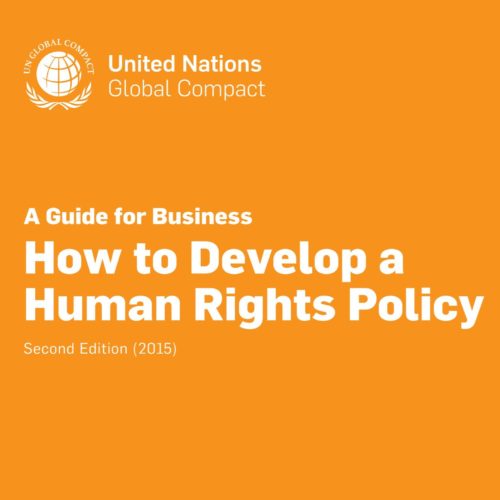-
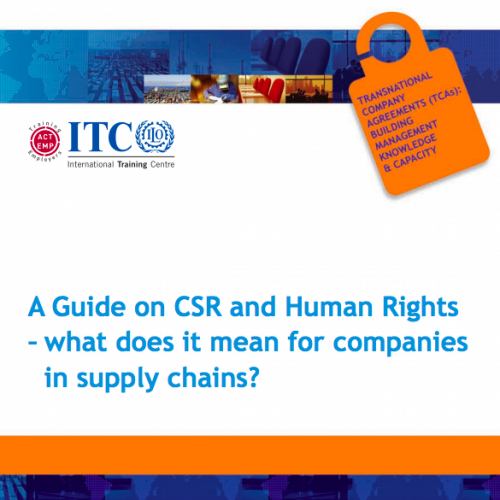 The Centre is the training arm of the ILO. This guidance is intended for small and medium-sized enterprises to understand, implement and adhere to the UN Guiding Principles on Business and Human Rights. It looks at the expectations placed on SMEs and buyers, the challenges they face and the support available for them.
The Centre is the training arm of the ILO. This guidance is intended for small and medium-sized enterprises to understand, implement and adhere to the UN Guiding Principles on Business and Human Rights. It looks at the expectations placed on SMEs and buyers, the challenges they face and the support available for them. -
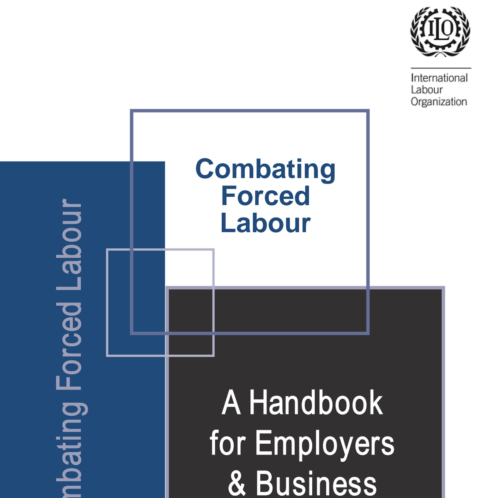 The ILO is the UN organisation responsible for setting and monitoring international labour standards. This handbook is intended as a resource for employers to coordinate a response to the risk of forced labour and human trafficking in supply chains. It is also intended to help strengthen capacity to address issues in operations and global supply chains. It provides employees and employers at different levels of business with guidance and tools to address the issue, and to identify and prevent trafficking.
The ILO is the UN organisation responsible for setting and monitoring international labour standards. This handbook is intended as a resource for employers to coordinate a response to the risk of forced labour and human trafficking in supply chains. It is also intended to help strengthen capacity to address issues in operations and global supply chains. It provides employees and employers at different levels of business with guidance and tools to address the issue, and to identify and prevent trafficking.Credit: International Labour Organisation (ILO)
-
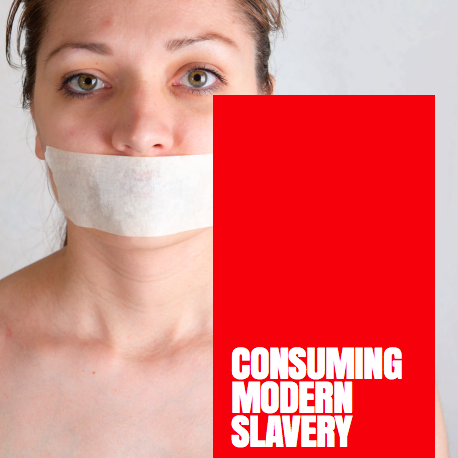 This report investigates how consumers understand modern slavery and their role in perpetuating and/or eradicating modern slavery. It is organised into three sections. The first section focuses on consumer perceptions of modern slavery, the second on consumer accounts and justifications for (widespread) inaction in relation to modern slavery, and the third on questions of consumer trust and responsibility within a multi-stakeholder environment. For each section findings are combined with related prior academic research and suggestions for change are made.
This report investigates how consumers understand modern slavery and their role in perpetuating and/or eradicating modern slavery. It is organised into three sections. The first section focuses on consumer perceptions of modern slavery, the second on consumer accounts and justifications for (widespread) inaction in relation to modern slavery, and the third on questions of consumer trust and responsibility within a multi-stakeholder environment. For each section findings are combined with related prior academic research and suggestions for change are made.Credit: University of Glasgow, University of Melbourne, Royal Holloway University of London
-
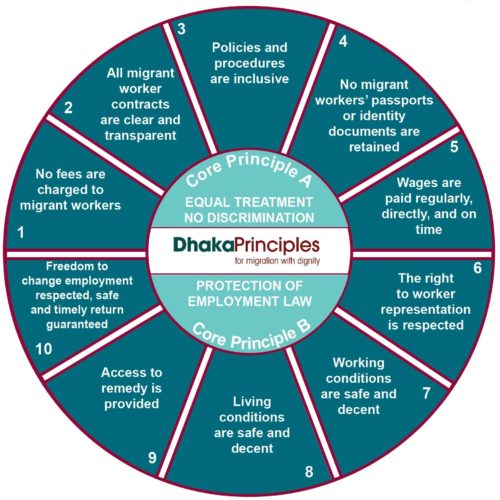 The Dhaka Principles provide a roadmap that traces a migrant worker from recruitment, through employment, to the end of contract. They provide key principles that employers and migrant recruiters should respect at each stage in the process to ensure migration with dignity.
The Dhaka Principles provide a roadmap that traces a migrant worker from recruitment, through employment, to the end of contract. They provide key principles that employers and migrant recruiters should respect at each stage in the process to ensure migration with dignity.Credit: Institute for Human Rights and Business
-
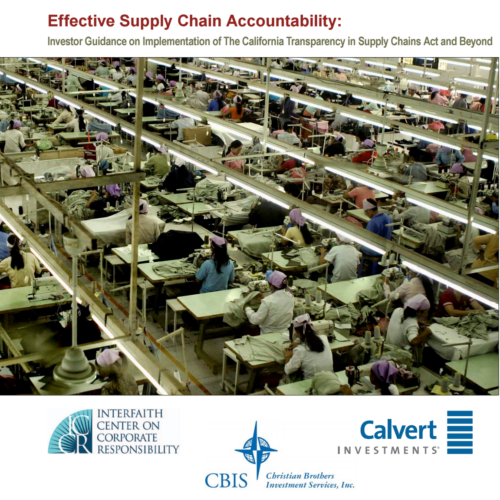 This guidance for investors outlines key steps relating to a company’s development of a specific anti-trafficking program, including elements the company should include in reports to demonstrate to stakeholders and shareholders that they are evaluating key risks in the supply chain and taking appropriate steps to address them. These include: - Develop and implement a human rights policy - Establish a human rights due diligence process - Conduct human rights risk assessments - Review, develop, and implement auditing, verification and traceability mechanisms - Train staff, suppliers, vendors, contractors, and auditors - Collaborate to expand efforts and influence - Produce a robust and substantive annual report
This guidance for investors outlines key steps relating to a company’s development of a specific anti-trafficking program, including elements the company should include in reports to demonstrate to stakeholders and shareholders that they are evaluating key risks in the supply chain and taking appropriate steps to address them. These include: - Develop and implement a human rights policy - Establish a human rights due diligence process - Conduct human rights risk assessments - Review, develop, and implement auditing, verification and traceability mechanisms - Train staff, suppliers, vendors, contractors, and auditors - Collaborate to expand efforts and influence - Produce a robust and substantive annual reportCredit: Interfaith Centre on Corporate Responsibility; Christian Brothers Investment Services; Calvert Investments.
-
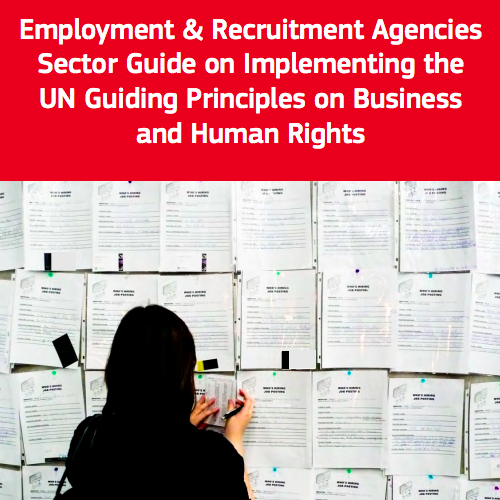 This Guide applies the UN Guiding Principles on Business and Human Rights to the specific context of employment and recruitment agencies. Recognising that each company is different, it is intended to help agencies “translate” respect for human rights into their own systems and company cultures. In December 2011, IHRB and Shift were selected by the European Commission (Directorate-General for Enterprise and Industry) to develop sector-specific guidance on the corporate responsibility to respect human rights, as set out in the UN Guiding Principles on Business and Human Rights.
This Guide applies the UN Guiding Principles on Business and Human Rights to the specific context of employment and recruitment agencies. Recognising that each company is different, it is intended to help agencies “translate” respect for human rights into their own systems and company cultures. In December 2011, IHRB and Shift were selected by the European Commission (Directorate-General for Enterprise and Industry) to develop sector-specific guidance on the corporate responsibility to respect human rights, as set out in the UN Guiding Principles on Business and Human Rights.Credit: Shift & Institute for Human Rights and Business (IHRB)
-
 Hedging Risk by Combating Human Trafficking: Insights from the Private Sector is designed to help companies share best practices so they can mitigate their risks and help eliminate this heinous practice. In this first of a series, we highlight insights and technology-driven interventions in the hospitality, finance, and transportation industries.
Hedging Risk by Combating Human Trafficking: Insights from the Private Sector is designed to help companies share best practices so they can mitigate their risks and help eliminate this heinous practice. In this first of a series, we highlight insights and technology-driven interventions in the hospitality, finance, and transportation industries.Credit: World Economic Forum
-
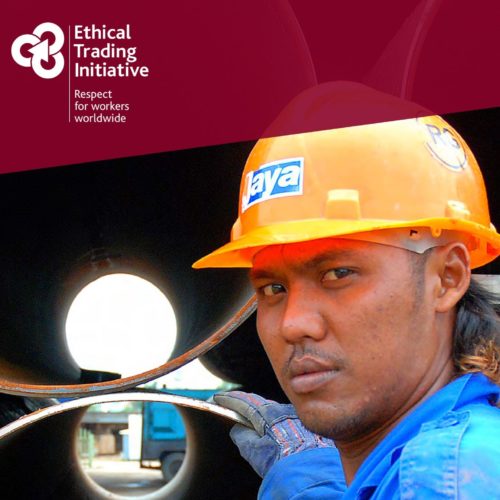 The Ethical Trading Initiative (ETI) is an alliance of companies, trade unions and NGOs that promotes workers' rights around the world. This guide is for companies to help them prevent and manage labour rights risks, and understand why engagement, negotiation and collaboration is key.
The Ethical Trading Initiative (ETI) is an alliance of companies, trade unions and NGOs that promotes workers' rights around the world. This guide is for companies to help them prevent and manage labour rights risks, and understand why engagement, negotiation and collaboration is key.Credit: Ethical Trading Initiative
-
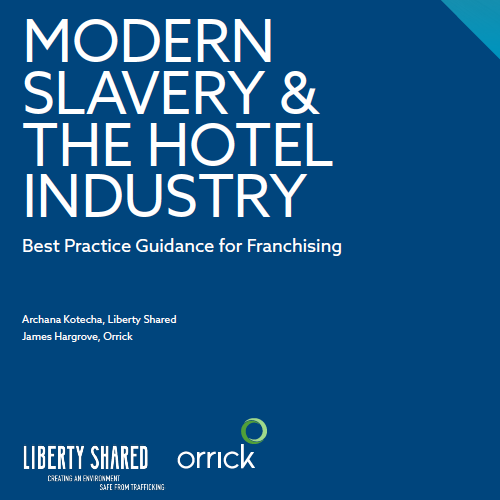 This guide, drafted by Liberty Shared, recognises the risks the hotel industry, and in particular hotels operating under major international brand franchises, face in regards to human rights abuses. This guide provides franchisors with an overview of the risks associated with modern slavery in relation to hotel franchise agreements and sets out practical solutions aimed at increasing the prospect that a franchisee's operations are free from these risks. Liberty Shared aims to prevent human trafficking through legal advocacy, technological interventions, and strategic collaborations with NGOs and corporations in Asia and globally.
This guide, drafted by Liberty Shared, recognises the risks the hotel industry, and in particular hotels operating under major international brand franchises, face in regards to human rights abuses. This guide provides franchisors with an overview of the risks associated with modern slavery in relation to hotel franchise agreements and sets out practical solutions aimed at increasing the prospect that a franchisee's operations are free from these risks. Liberty Shared aims to prevent human trafficking through legal advocacy, technological interventions, and strategic collaborations with NGOs and corporations in Asia and globally.Credit: Liberty Shared
-
 The ILO is a UN organisation responsible for setting and monitoring international labour standards. This ILO paper includes an introduction and background to the context of labour recruitment in a period of increased global mobility, and details existing international and national labour standards to regulate recruitment of workers. It includes examples from the UK.
The ILO is a UN organisation responsible for setting and monitoring international labour standards. This ILO paper includes an introduction and background to the context of labour recruitment in a period of increased global mobility, and details existing international and national labour standards to regulate recruitment of workers. It includes examples from the UK.Credit: International Labour Organisation (ILO)
-
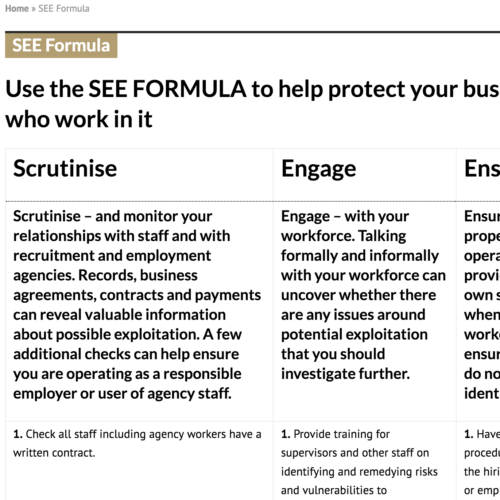 The Staff Wanted Initiative is a collaborative effort from Anti-Slavery International, the UK's only charity dedicated solely to ending modern slavery, and the IHRB, a leading international think tank on business and human rights. The Initiative works to raise awareness and end exploitation of workers in UK hotels. The SEE formula is a three-fold approach to protecting business from labour rights violations - "Scrutinise, Engage, Ensure". It emphasises the need to monitor relationships between and with employees, to communicate informally and formally with workforce, and to provide staff with clear operational procedures when dealing with agency workers.
The Staff Wanted Initiative is a collaborative effort from Anti-Slavery International, the UK's only charity dedicated solely to ending modern slavery, and the IHRB, a leading international think tank on business and human rights. The Initiative works to raise awareness and end exploitation of workers in UK hotels. The SEE formula is a three-fold approach to protecting business from labour rights violations - "Scrutinise, Engage, Ensure". It emphasises the need to monitor relationships between and with employees, to communicate informally and formally with workforce, and to provide staff with clear operational procedures when dealing with agency workers.Credit: Staff Wanted Initiative
-
 Stronger Together is a multi-stakeholder initiative which aims to reduce modern slavery. It provides guidance, training and resources to organisations, employers, labour providers, workers and their representatives. This free collection of resources includes pragmatic guidance and toolkits, and resources for the workplace including multilingual posters, leaflets and template policies. This toolkit provides guidance and good practice for responsible businesses to develop a robust strategy to prevent, uncover, and report modern slavery, particularly forced labour and human trafficking, which may be occurring within their supply chains. It is intended primarily for staff working within a CSR capacity but can also be used by staff working in social compliance, procurement HR and risk management.
Stronger Together is a multi-stakeholder initiative which aims to reduce modern slavery. It provides guidance, training and resources to organisations, employers, labour providers, workers and their representatives. This free collection of resources includes pragmatic guidance and toolkits, and resources for the workplace including multilingual posters, leaflets and template policies. This toolkit provides guidance and good practice for responsible businesses to develop a robust strategy to prevent, uncover, and report modern slavery, particularly forced labour and human trafficking, which may be occurring within their supply chains. It is intended primarily for staff working within a CSR capacity but can also be used by staff working in social compliance, procurement HR and risk management.Credit: Stronger Together
-
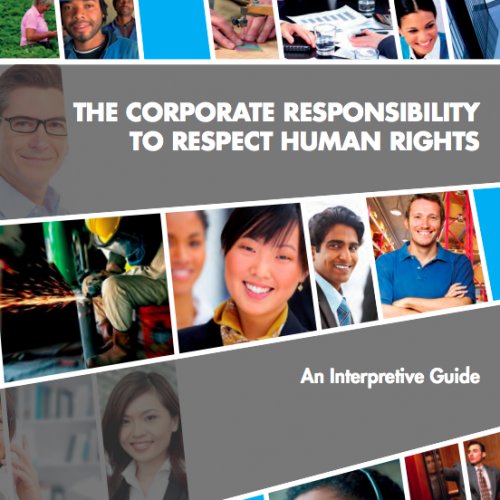 This publication is the official guidance accompanying the UN Guiding Principles on Business and Human Rights; it is designed to support effective implementation.
This publication is the official guidance accompanying the UN Guiding Principles on Business and Human Rights; it is designed to support effective implementation.Credit: OHCHR
-
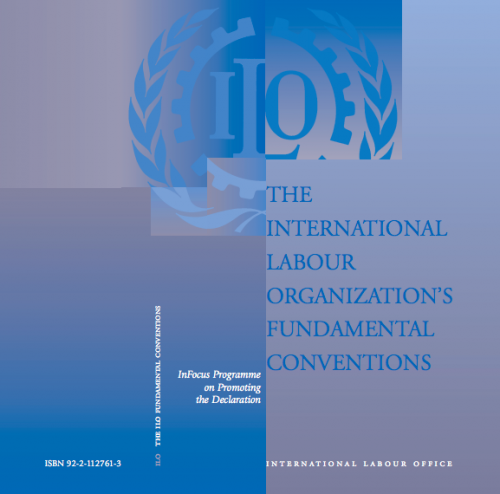 The ILO is the UN organisation responsible for setting and monitoring international labour standards. The ILO has identified eight conventions covering subjects they consider to be fundamental principles and rights at work. These are at times referred to as the core labour standards: ● Freedom of Association and Protection of the Right to Organise Convention, 1948 (No. 87) ● Right to Organise and Collective Bargaining Convention,1949 (No. 98) ● Forced Labour Convention, 1930 (No. 29) ● Abolition of Forced Labour Convention, 1957 (No. 105) ● Minimum Age Convention, 1973 (No. 138) ● Worst Forms of Child Labour Convention, 1999 (No. 182) ● Equal Remuneration Convention, 1951 (No. 100) ● Discrimination (Employment and Occupation) Convention, 1958 (No. 111)
The ILO is the UN organisation responsible for setting and monitoring international labour standards. The ILO has identified eight conventions covering subjects they consider to be fundamental principles and rights at work. These are at times referred to as the core labour standards: ● Freedom of Association and Protection of the Right to Organise Convention, 1948 (No. 87) ● Right to Organise and Collective Bargaining Convention,1949 (No. 98) ● Forced Labour Convention, 1930 (No. 29) ● Abolition of Forced Labour Convention, 1957 (No. 105) ● Minimum Age Convention, 1973 (No. 138) ● Worst Forms of Child Labour Convention, 1999 (No. 182) ● Equal Remuneration Convention, 1951 (No. 100) ● Discrimination (Employment and Occupation) Convention, 1958 (No. 111)Credit: Copyright © International Labour Organization, 2002
-
 This guide provides support for hotel owners to uphold and protect human rights in their business and understand risk areas. It includes information and case studies about risk areas, tools and instruments to help companies adhere to the law and implement good practice, and a step-by-step guide for companies to meet the responsibility to respect human rights.
This guide provides support for hotel owners to uphold and protect human rights in their business and understand risk areas. It includes information and case studies about risk areas, tools and instruments to help companies adhere to the law and implement good practice, and a step-by-step guide for companies to meet the responsibility to respect human rights.Credit: University of Liverpool

